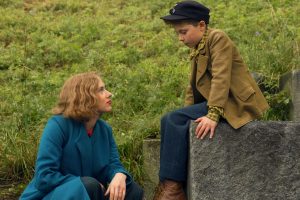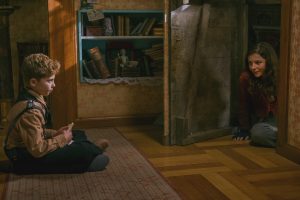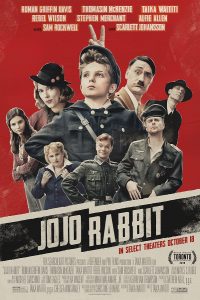“Jojo Rabbit” (2019). Cast: Roman Griffin Davis, Scarlett Johansson, Thomasin McKenzie, Taiki Waititi, Sam Rockwell, Rebel Wilson, Alfie Allen, Stephen Merchant, Archie Yates. Director: Taiki Waititi. Screenplay: Taiki Waititi. Book: Christine Leunens, Caging Skies. Web site. Trailer.
Growing up can be difficult enough as we seek to understand the complexities of the world around us. But, if we add to that a quest to grasp an emerging sense of self and the place we occupy in our existence, the task can become overwhelming. Where do we turn for guidance? Who can we trust? And what advice should we seriously consider? Those questions might seem obvious and fundamental, but that doesn’t make them any less daunting, especially for those who lack direction on which way they should turn. So it is for an impressionable young man in the engaging and unusual new coming of age story, “Jojo Rabbit.”
Young Johannes Betzler (Roman Griffin Davis) is having trouble fitting in. Growing up in Germany in the waning days of World War II, the likable but geeky 10-year-old is looking to find himself, a formidable challenge given the deteriorating conditions in the homeland and in his own personal circumstances. With his soldier father supposedly missing in action and his older sister Inge having recently died from influenza, he lives with his doting mother, Rosie (Scarlett Johansson), a caring soul who tries to help the lad in his quest. But it’s an effort he often resists; he sees her sensitivity as holding him back from becoming the man he believes he’s supposed to be (even though he is more innately compassionate than he’s willing to admit). She’s also somewhat secretive, a quality he finds quietly suspect, despite not knowing exactly what’s driving those feelings.
To compensate for all this, Johannes decides to join a Hitler youth group with his best friend, Yorki (Archie Yates), an operation run by the somewhat-befuddled Capt. Klenzendorf (Sam Rockwell). He hopes that being in the company of peers will help him to shape up and find himself. Also, as an ardent patriot concerned about the sinking welfare of the Fatherland, he genuinely aspires to serve his country in a heartfelt, meaningful way by learning about military tactics and upholding the principles of the Reich. He even has a personal avatar to help guide him, Adolph (Taiki Waititi), a comical imaginary embodiment of the Führer who speaks to his young follower in a way that the impressionable youth can understand.
[caption id="attachment_11092" align="aligncenter" width="350"] Impressionable youth Jojo Betzler (Roman Griffin Davis, left) converses with his imaginary friend and avatar, Adolph (Taika Waititi, right), in the comical and controversial coming of age story, “Jojo Rabbit.” Photo by Kimberly French, courtesy of Twentieth Century Fox Film Corporation.[/caption]
Impressionable youth Jojo Betzler (Roman Griffin Davis, left) converses with his imaginary friend and avatar, Adolph (Taika Waititi, right), in the comical and controversial coming of age story, “Jojo Rabbit.” Photo by Kimberly French, courtesy of Twentieth Century Fox Film Corporation.[/caption]
However, despite the youngster’s gumption and sincerity, he quickly discovers he’s not cut out for becoming a youth group member. Despite words of encouragement from Adolph, he lacks the capacity for the kind of cut-throat activities being taught, such as a lesson in callously snapping the neck of a cute, cuddly bunny. He’s branded a coward, one who would unhesitatingly flee in the face of danger, not unlike the now-deceased cottontail, a reputation that earns him the disparaging nickname Jojo Rabbit.
Embarrassed and disheartened, Jojo feels dejected that his latest efforts to find himself seem to have yet again failed. Rosie sees his disappointment and decides to intervene, helping Jojo to get an assignment working as an administrative aide to Capt. Klenzendorf and his minions (Rebel Wilson, Alfie Allen), a post that apparently suits him. The youngster feels as though he’s finally making a meaningful contribution, one that serves the interests of the Fatherland, even if it’s not exactly the kind of heroic effort that he had hoped to make. Little does he know, though, that there’s an opportunity waiting in the wings for that, should he choose to pursue it.
While at home alone one day, Jojo hears mysterious sounds coming from his late sister’s bedroom. He investigates and discovers a teenage Jewish girl, Elsa (Thomasin McKenzie), hiding in an adjacent crawlspace. Jojo is shocked, especially when he learns that Rosie is responsible for shielding Elsa, who had been one of Inge’s best friends. He’s appalled that his own mother would do something so blatantly against the interests of the Reich, especially given her many connections to those in the local Nazi hierarchy. He’s also shocked that he’s in such close proximity to someone Jewish, particularly in light of all of the “hideous” qualities he’s heard about these alleged enemies of his people.
[caption id="attachment_11093" align="aligncenter" width="350"] Aspiring Hitler youth group member Jojo Betzler (Roman Griffin Davis, right) struggles to find himself, even with the guidance of his doting mother, Rosie (Scarlett Johansson, left), in director Taika Waititi’s “Jojo Rabbit.” Photo by Larry Horricks, courtesy of Twentieth Century Fox Film Corporation.[/caption]
Aspiring Hitler youth group member Jojo Betzler (Roman Griffin Davis, right) struggles to find himself, even with the guidance of his doting mother, Rosie (Scarlett Johansson, left), in director Taika Waititi’s “Jojo Rabbit.” Photo by Larry Horricks, courtesy of Twentieth Century Fox Film Corporation.[/caption]
Jojo is compelled to do something about this unforgiveable breach, but the upstart is quickly put in his place by both Elsa and Rosie. Elsa calls out Jojo as a little man seeking to fill big shoes by joining a movement whose dastardly initiatives he barely understands, contending that he’s just following the crowd in hopes that it will help him feel like he’s finally found a place where he can fit in. Rosie, meanwhile, attempts to use the situation as a teaching moment, urging Jojo to look into his heart to find his compassion and to realize that others who are different from him are not the monsters they’ve been made out to be.
Before long, Jojo is torn about what to do: Should he do his “civic duty” and turn in the fugitive hiding in his house? Or should he allow himself to follow his heart and demonstrate his capacity for the human kindness of which he’s just now beginning to become aware? It’s a difficult decision, one that frequently gets tested, most notably when he’s paid a visit by the head of the local Gestapo (Stephen Merchant) after rumors begin to spread about what may be happening in his home. And, through it all, Jojo continues engaging in his virtual conversations with Adolph, who grows steadily more insistent about what he believes his loyal disciple must do, not only to be a good citizen, but also to be a “real” man.
With Russian and American forces quickly encroaching from opposite directions, and with dramatic events that hit close to home increasingly impinging on Jojo’s personal circumstances, the young man will soon face difficult choices that affect both him and those close to him. And, as events reach a crescendo, it remains to be seen what decisions he’ll make. But, given his desire to be a true hero, one can only hope that he follows a path in line with that desire.
[caption id="attachment_11094" align="aligncenter" width="350"] Patriotic Nazi youth Jojo Betzler (Roman Griffin Davis, left) is perplexed about what to do when he finds a Jewish teenager, Elsa (Thomasin McKenzie, right), hiding in a crawlspace in his family home in the controversial new comedy, “Jojo Rabbit.” Photo by Kimberly French, courtesy of Twentieth Century Fox Film Corporation.[/caption]
Patriotic Nazi youth Jojo Betzler (Roman Griffin Davis, left) is perplexed about what to do when he finds a Jewish teenager, Elsa (Thomasin McKenzie, right), hiding in a crawlspace in his family home in the controversial new comedy, “Jojo Rabbit.” Photo by Kimberly French, courtesy of Twentieth Century Fox Film Corporation.[/caption]
Finding oneself is often a challenging process, and Jojo’s experience makes that abundantly clear. Since it’s a quest that doesn’t come with an instruction manual, there’s usually nothing tangible to grasp onto in charting a course and being able to move forward. However, a good starting point – even if not fully enlightening at the outset – is to look within, to examine our inner being, as that may provide some valuable clues. This is particularly true when it comes to our thoughts, beliefs and intents, the cornerstone of who we are, what we want and what we hope to achieve through the conscious creation process, the philosophy that maintains we draw upon these resources in manifesting the reality we experience. Deciphering this interior landscape can be complicated and puzzling, but it at least has the potential to steer us in the right direction.
Examining our beliefs can be filled with surprises. For example, Jojo seems to think that all young men are supposed to grow into some kind of uber-macho mindset, one in which they assert themselves as tough, courageous individuals. What’s more, they’re supposed to swear to following the chain of command, unswervingly and unquestioningly demonstrating loyalty and following orders, no matter what they are or who gives them. He’s clearly bought into a well-established way of thinking, the embodiment of the classic male stereotype.
But, as Jojo slowly comes to discover, courage takes many forms, not all of which conform to the classic conventional model. Courage, for instance, can also come from being willing to freely exercise one’s individuality, even if its qualities differ from those of more widely accepted prototypes. In a regimented society like Nazi Germany, taking steps to openly affirm one’s worldview in the face of the rigid control tactics of an authoritarian regime is a supreme act of defiance, one that requires vast infusions of personal courage. It’s a prospect that Jojo eyes as he gets to know himself better, learning what his true beliefs are, despite the peer pressure he faces from so many others, including his outspoken imaginary friend.
Jojo faces a particularly difficult task when it comes to tuning out Adolph’s influence. As someone who lacks a meaningful male role model to help guide him in his development, it’s understandable how he’d gravitate to a strong-willed, charismatic figure like his personal avatar. But can Jojo trust the “advice” he’s being fed? Considering what the Nazi autocrat stands for and given Jojo’s emerging awareness of his sense of self, there’s quite a disconnect between these viewpoints. He’s faced with quite a difficult decision in choosing which path to embrace.
[caption id="attachment_11095" align="aligncenter" width="350"] With the assistance of his mother, Rosie (Scarlett Johansson, second from left), geeky Hitler youth group member Jojo Betzler (Roman Griffin Davis, second from right) finds a suitable post working as an administrative aide to the befuddled Capt. Klenzendorf (Sam Rockwell, left) and his minion, Fräulein Rahm (Rebel Wilson, right), in director Taika Waititi’s “Jojo Rabbit.” Photo by Larry Horricks, courtesy of Twentieth Century Fox Film Corporation.[/caption]
With the assistance of his mother, Rosie (Scarlett Johansson, second from left), geeky Hitler youth group member Jojo Betzler (Roman Griffin Davis, second from right) finds a suitable post working as an administrative aide to the befuddled Capt. Klenzendorf (Sam Rockwell, left) and his minion, Fräulein Rahm (Rebel Wilson, right), in director Taika Waititi’s “Jojo Rabbit.” Photo by Larry Horricks, courtesy of Twentieth Century Fox Film Corporation.[/caption]
Of course, there’s always the possibility that Jojo created a presence like Adolph to help shepherd him in the right direction by purposely giving himself a negative example, one so ultimately repulsive that it’s patently obvious he embodies a mindset that is not meant to be followed. As counterintuitive as that might seem, sometimes we give ourselves our best advice through exposure to influences we’re truly supposed to avoid. Doing so pushes us to think for ourselves, to disregard the conventional “wisdom” in favor of our own outlooks, a practice that can pay big personal dividends in the long run.
One of the most important benefits that comes from this is an appreciation of our sense of personal integrity. Being truthful with ourselves, especially when it comes to assessing, appreciating and embracing our beliefs, is essential to getting the best results with our manifestation efforts. When we’re in sync with what we really think, feel and believe, we’re much more likely to experience an existence that faithfully reflects these qualities. It’s somewhat ironic, for example, that Jojo begins to discover things about himself as the war winds down and the Reich’s rule evaporates. The dissolution and disappearance of those negative elements of his reality reflect the emergence of his positive inner qualities. With the unwanted aspects of his existence being swept away, space is opened up to make room for more desirable ones – peace, compassion and the ability to be oneself, no matter what. One might not think this amounts to much when it occurs on an individual scale, but, when it happens for multiple individuals simultaneously, it can create a groundswell of change that has the potential to reform society overall. And that, for what it’s worth, represents a fundamental shift, one from which all of us can benefit.
Writer-actor-director Taika Waititi has taken quite a chance with this comical and controversial coming of age story. The film walks a fine line between evoking hearty laughs while addressing the atrocities of the Nazi regime, a satirical mix that squarely hits some notes while sadly missing others. The picture starts out strong and finishes well, though its drawn-out, meandering middle stymies the film’s overall momentum, detracting from the film’s bookend segments. To its credit, “Jojo Rabbit” features fine performances by Davis as the often-baffled youth (proving again, as in “Hunt for the Wilderpeople” (2016), that the filmmaker is quite adept at working with young actors) and by Waititi as Adolph, as well as an excellent Wes Anderson-esque production design and a fittingly hip rock ʼn roll soundtrack. However, in seeking to take his filmmaking ability to the next level, Waititi comes up short, not quite attaining the auteur status that he obviously sought with this production. It’s a valiant and noble effort overall but one where the director’s reach definitely exceeds his grasp.
Our personal explorations of discovery can be filled with joy, terror and uncertainty, sometimes all at once. Sorting out matters can prove quite challenging, too, especially if we lack the tools to handle the task. However, by earnestly looking within, the answers will become unlocked, providing us with the guidance on how to proceed. The process may not be without obstacles, and we might not get things “right” on our first attempt, but it at least gets us started. One would hope it takes us in the right direction, infusing us with the courage to stand up and be ourselves – even when circumstances try to make us feel like frightened rabbits, a threat that can be successfully thwarted before it ever takes hold.
Copyright ©2019, by Brent Marchant. All rights reserved.
Wednesday, November 13, 2019
‘Jojo Rabbit’ charts the challenges of growing up
Subscribe to:
Post Comments (Atom)

No comments:
Post a Comment